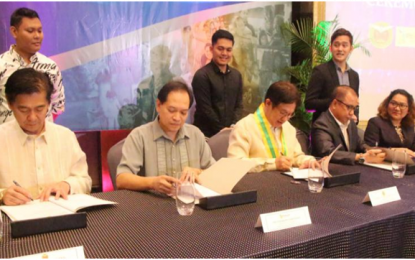
HEALTH PACT. Department of Health (DOH) Calabarzon Regional Director Dr. Eduardo C. Janairo (center) joins regional executives and representatives of the Department of the Interior and Local Government (DILG), PhilHealth and regional health units in the signing of the Joint Regional Memorandum Circular and Mid-Practicum Assessment Session for the Municipal Leadership and Governance Program (MLGP) Course - on coaching and mentoring development among local mayors - at the regional gathering held at the Manila Diamond Hotel on Aug. 24, 2018. (Photo courtesy of DOH4A-MRCU)
CALAMBA CITY, Laguna -- The Department of Health (DOH) regional office spearheaded on Friday the signing of a joint memorandum to improve health delivery system in Region 4-A (Calabarzon).
DOH officials and mayors from Cavite, Laguna, Batangas, Rizal and Quezon signed the Joint Regional Memorandum Circular and Mid-Practicum Assessment Session on Municipal Leadership and Governance Program (MLGP) Course in an event held at Manila Diamond Hotel.
The signing of the joint memorandum with the Department of the Interior and Local Government (DILG) and the Philippine Health Insurance Corp. (PhilHealth) aims to assist local leaders in addressing access, utilization, coverage and equity issues in their respective jurisdictions.
DOH-Calabarzon Regional Director, Dr. Eduardo C. Janairo, reminded health and local government executives on the importance of implementing the coaching and mentoring system for the region that would ensure improved health services delivery system to their respective local stakeholders.
“This will create an inter-agency committee that will provide support and assistance to Local Government Units (LGUs) in achieving the health-related sustainable goals (SDG) in 2030 which focus on improving the leadership and management practices of local leaders,” Janairo said.
According to Janairo, LGU executives will undergo a “coaching and mentoring” development program for which they will be guided in their management, supervision and implementation of plans to have a unified effort in the development of their local health system, health financing and health service delivery.
Under the memorandum, the DOH, DILG and PhilHealth regional offices will oversee the institutionalization, implementation and monitoring of health programs by the LGUs for the accomplishment of the desired health outcomes at the local level.
“Through this approach, we hope to bridge the gap between knowledge and effective management that will lead to improvements in core health system areas, including quality of clinical care, data-driven decision making, leadership and accountability, and satisfaction of community,” he said.
Glen S. Ramos, community affairs and media relations officer of DOH Calabarzon, said the joint project is in partnership with the University of the Philippines Manila-College of Public Health (UP-CPH) and the Development Academy of the Philippines (DAP) as academic partners under the Health Leadership and Governance Program.
Ramos said through the MLGP course, local chief executives and municipal health officers will undergo 18 months of leadership program supplemented by coaching and mentoring sessions on local health system development.
The course covers good governance in the health sector, Health Service Delivery, Health Workforce, Health Information, Access to Essential Medicines and Healthcare Financing.
He added that program participants are required to complete the four-day Module 1 sessions, six-month practicum, four-day Module 2 sessions and another six-month practicum before they can graduate.
In his opening remarks, DOH-Calabarzon Assistant Regional Director, Dr. Noel G. Pasion, urged local leaders to further strengthen their local health system to enable residents of rural areas to achieve access to essential services. (PNA)
